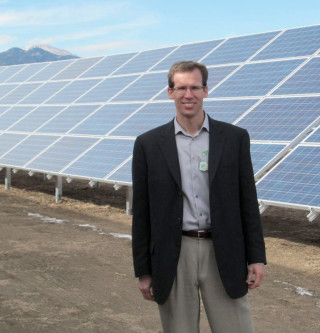Has a Carbondale, CO, company found the ‘holy grail’ of community renewable energy projects? In this podcast with with Paul Spencer, President and founder of the Clean Energy Collective (CEC) in Carbondale, CO, we explored how CEC is pioneering the process of delivering clean power-generation through medium-scale (mostly solar) facilities that are collectively owned by participating utility customers.
Local Energy Rules podcast, Ep. 6: Play in new window | Download | Embed
“From the outset, we really strived to find something that was going to be widely applicable,” Paul says in the interview.
It’s no easy task. Many other community solar projects have been one-offs, finding ways to work within a particular state or utility regime but unable to bring that model to another community. The Clean Energy Collective did a great deal of research on taxation, incentives, and securities law before they launched several years ago. As a result, the CEC model reaches beyond their start in Colorado to places like New Mexico, Minnesota and Vermont.
They’ve also overcome the problem of sharing electricity output from their community energy projects. Only eight states have so-called virtual net metering laws that allow individuals to share electricity output from a common energy project. CEC has developed their own billing software for utilities that allows them to distribute the bill credits without needing any changes in state law. The result is several partnerships with rural cooperatives that gives the CEC a new market and the cooperative members a chance to buy in to a community solar array.
The Clean Energy Collective is also special because participants don’t lease their panels, they own them. Paul explains that this was a conscious decision:
[A lease] was the first model we looked at…We ran the numbers…it’s a pretty minimal return over time. You just break even, you don’t own the thing anymore, and it goes away. We then ran a comparison to ownership…it’s night and day. Over the life of a system, an ownership model will produce nearly 3 to 4 times as much asset value as a lease. That’s 3-4 times as much payback to the consumer…we said, ‘we gotta figure out how to have people own this.’
The Clean Energy Collective continues to expand their model into new places, continuing a tradition of partnership with local utilities. It also benefits from making the process of participation remarkably easy. Says Paul, Clean Energy Collective is “the only solar company I know of in the world where you can fully purchase a solar system online, any time of the day you want. We never have to come out to your house, we never have check your roof…you don’t even have to have a home.”
This is the 6th edition of Local Energy Rules, a new ILSR podcast that is published twice monthly, on 1st and 3rd Thursday. In this podcast series, ILSR Senior Researcher John Farrell talks with people putting together great community renewable energy projects and examining how energy policies help or hurt the development of clean, local power.
Click to subscribe to the podcast: iTunes or RSS/XML, sign up for new podcast notifications and weekly email updates from the energy program!



